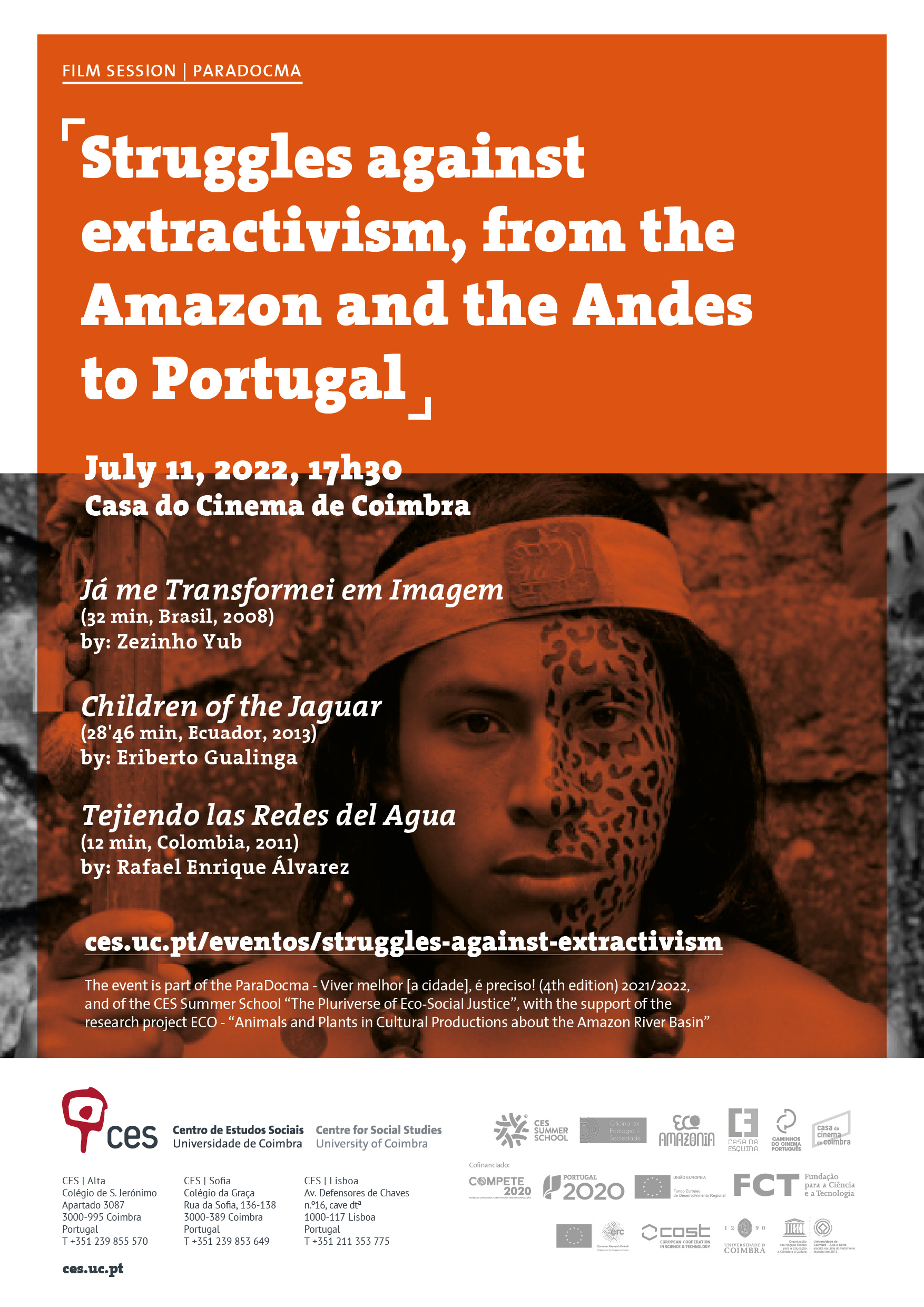Sessão Cinematográfica | ParaDocma
Lutas contra o extrativismo, desde a Amazónia e os Andes até Portugal
11 de julho de 2022, 17h30
Casa do Cinema de Coimbra
Apresentação
Projeção dos filmes Já me Transformei em Imagem (Brasil, 2008) de Zezinho Yube, Children of the Jaguar (Equador, 2013) de Eriberto Gualinga, e Tejiendo las Redes del Agua (Colômbia, 2011) de Rafael Enrique Álvarez, seguido de um debate sobre a situação atual das lutas indigenas anti-extrativistas na Amazónia e nos Andes, bem como os paralelos entre as lutas nestes territórios e em Portugal.
Já me Transformei em Imagem (32 min, 2008) Direção: Zezinho Yube
Fotografia: Mari Corrêa, Tadeu Siã, Vincent Carelli e Zezinho Yube Montagem: Zezinho Yube e Ernesto Ignacio de Carvalho
Produção: Vídeo nas Aldeias
Children of the Jaguar (28 min, 2012)
Argumento: Eriberto Gualinga e Amnistia Internacional
Fotografia: Eriberto Gualinga, Rosie Khun, Pavel Quevedo, Sergio Sojo Granados e Sergio Sojo Álvarez
Som: Eriberto Gualinga, Rosie Khun, Pavel Quevedo, e Sergio Sojo Granados
Produção: Eriberto Gualinga, Mariano Machain, e David Whitbourn
Tejiendo las Redes del Agua (12 min, 2011)
Edição: Rafael Enrique Álvarez Domenech
Câmara fotográfica: Rafael Enrique Álvarez Domenech Argumento: Danilo Urrea
Bytes sonoros: Batidas de Baixo de Cumbia Produção: Censat Agua Viva - Amigos de la Tierra Fotografia: Gert Steensens- Esperanza Próxima Ilustração: Angie Vanessita
Som desligado: Olmedo Tapias
Os três filmes são em português e espanhol, com legendas em inglês. O debate será em inglês, com tradução sussurrada em português e/ou espanhol para as pessoas que necessitem.
O evento faz parte do ParaDocma - Vivermelhor [a cidade], é preciso! (4ª edição) 2021/2022, e da Escola de Verão CES"O Pluriverso de Justiça Eco-Social", com o apoio do projecto de investigação ECO - "Animals and Plants in Cultural Productions about the Amazon RiverBasin".
- AEscola de Verão CES "O Pluriverso de Justiça Eco-Social" (11-16 de Julho) é organizada pela Oficina de Ecologia e Sociedade (ECOSOC, CES-UC), em co-organização com a COST Action "Decolonizing Development” (DECOLDEV), e com o apoio dos projectos H2020 "Just Transition to the Circular Economy" (JUST2CE), e "The Rise of Citizens Voices for a Greener Europe" (PHOENIX); e do "Pr. Claus Chair in Equity and Development 2019-2021" do International Institute for Social Studies (ISS), Erasmus University Rotterdam.
- ParaDocmaé uma iniciativa organizada pela Casa da Esquina, Cine Eco Seia e a Oficina de Ecologia e Sociedade do Centro de Estudos Sociais/UC (ECOSOC, CES-UC), e outras organizações
- ECO | Animais e Plantas em Produções Culturais sobre a Bacia do Rio Amazonas(2022-2026) (GA 101002359) é uma Bolsa ERC Consolidator liderada por Patricia Procura recorrer o pensamento amazónico e a ecocrítica para avaliar a forma como as produções culturais humanas sobre a Amazónia dão voz a animais e plantas.
Programa
- Introdução à sessão (5 min) por Patrícia Vieira (CES)
- Exibição dos filmes (1h15min) Já me Transformei em Imagem (32 min), Children of the Jaguar (28 min), e Tejiendo las Redes del Agua (12 min)
- Comentários (20 min) por Ruth Arias, Carla Gomes e Tatiana Roa Avendaño
- Debate público (20 min) moderado por Paola Minoia
Notas biográficas
Patrícia Vieira é Investigadora FCT (Desenvolvimento) no Centro de Estudos Sociais (CES) da Universidade de Coimbra no núcleo NHUMEP. As suas áreas de investigação são Literatura Ibérica e Latino-Americana, Humanidade Ambientais e Ecocrítica, Literatura Comparada, Literatura e Cinema, Estudos Pós-Coloniais e Teoria Literária. Tem um Doutoramento em Línguas e Literatura Românicas da Universidade de Harvard. Lecciona na Universidade de Georgetown como professora catedrática. É Coordinadora (PI) do projecto ECO.
Ruth Arias-Gutiérrez é uma mulher militante, andino-amazónica, trabalhadora pela biodiversidade, equidade e exercício de direitos e responsabilidades, e professora de Ciências Ambientais na Universidad Estatal Amazónica em Puyo, Equador. Participou como membro da rede de gestão ambiental da Amazónia equatoriana com conhecimentos indígenas, da Rede Internacional Terra do Futuro, do grupo de trabalho dos povos indígenas da Associação Canadiana de Estudos da América Latina e Caribe (ACELAC), e da Associação de Estudos da América Latina (LASA). Também faz parte da COST Action Decolonizing Development.
Carla Gomes faz parte da Associação Unidos Covas do Barroso, uma pequena aldeia sob ameaça de um enorme projecto de mineração de lítio. Nasceu e foi criada lá e, apesar de já não viver lá, continua a regressar frequentemente. É uma analista de bases de dados por profissão, uma feminista por necessidade, e uma voluntária para a integração de refugiados por opção.
Paola Minoia é Professora Associada nas Universidades de Turim e Helsínquia. Os seus interesses cruzam os campos da ecologia política, da geografia humana e dos estudos de desenvolvimento global com um enfoque na territorialidade, nas relações entre grupos estatais e minoritários, na justiça sócio-ambiental, nos conhecimentos eco-culturais e no pluriverso. Está envolvida no projecto “Ecocultural pluralism in the Ecuadorian Amazonia”(financiado pela Academia da Finlândia) e na COST Action “Decolonising Development: Research, Action and Practice”.
Tatiana Roa Avendaño é ambientalista, educadora e investigadora do Censat Agua Viva - Colombia. É doutoranda em ecologia política no Centro de Investigação e Documentação para a América Latina (CEDLA) - Universidade de Amesterdão. Tem escrito vários artigos e livros sobre extrativismo, justiça da água e soberania energética. Como activista, faz parte da Oilwatch, a Alianza Libre de Fracking e a Mesa Social Minero Energética. Também tem convergido com diversos grupos de investigação como a Alianza por la Justicia Hídrica, e os Grupos de Trabalho da CLACSO "Ecología Política Abya-Yala", e "Territorialidades en Disputa y R-existencia".
Extensão de festival de cinema e debates
ParaDocma - Viver melhor [a cidade], é preciso! (4.ª edição)


